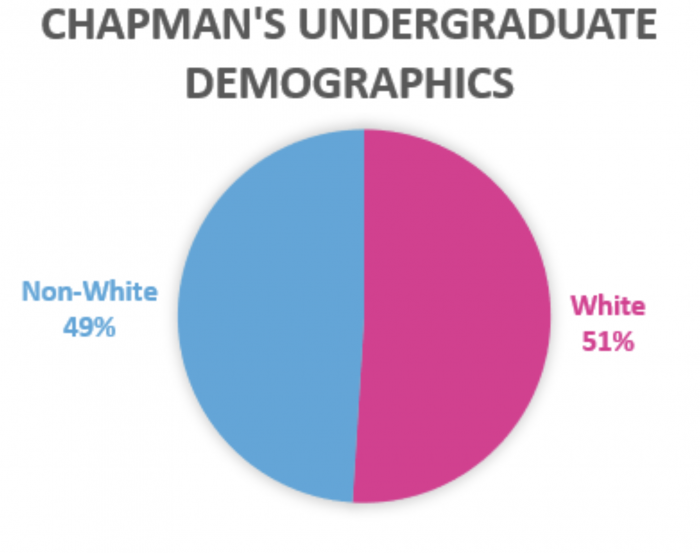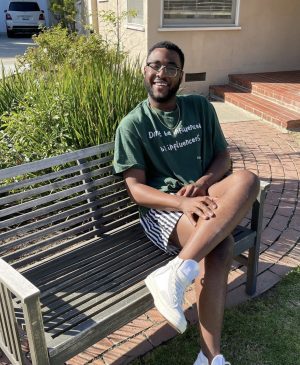
Exclusivity is what makes Greek life, well, Greek life. That’s not always a bad thing. It weeds out the straight A students from the slackers and the nice people from the indecent.
But the problem is, many students believe it has gone too far.
How will Black, Indigenous, and People of Color be included in a historically white system they believe is designed to exclude them?

“I was scrolling down instagram, through all of these Greek life pictures and thought, this is not 51% white, it’s more like 90,” said Lily Moore, senior, business major and active member of Delta Gamma.
As the call for anti-racism work spurred across institutions this fall, Chapman students have reevaluated the curriculum within Greek life to encourage students to go beyond performative actions and dismantle racism within their chapters.
“We are trying to implicate a zero-tolerance policy for racism,” said Ale Chow, sophomore, business major, and representative for Kappa Kappa Gamma’s diversity committee.
Chapman University is home to eight sororities and ten fraternities. Each chapter is required to have a representative for the Diversity, Equity and Inclusion committee, which meets every Sunday and is hosted by the Interfraternity Council and Panhellenic. Each meeting consists of slideshows and discussions on topics like implicit bias, microaggressions, disciplinary actions, and so on. Though every chapter is its own governing body, and has the power to implement diversity training as they so please.

“Not being racist and not discriminating during recruitment is the BARE MINIMUM. I do not think we should be applauded for doing these workshops, because it’s pretty embarrassing that we have to teach these basic things,” said Chow.
Keeping these points in mind, Chow shares her personal experiences during rush.
“I’m from Mexico, and during recruitment, a lot of the questions I was asked were just a lack of intelligence. For example, I’m not gonna say which sorority it was, but I got asked if I struggle with English, and I was like um excuse me what… we go to the same college, and take classes at the same level… like what are you saying,” said Chow, “it was hurtful and awkward.”
These weekly diversity meetings are intended to start conversations about racial discrimation, as representatives should share the key takeaways with their organization.
Yet reforming Greek Life can’t be done by just forming a committee, as it should come from within. “Chapman doesn’t mandate that there is training required,” said Nikki Schwartz, the Interfraternity Council advisor.
Remodeling the system would require active participation from ALL chapters. But some of the Greek members who spent the summer reposting graphics with the trending #BlackLivesMatter tags have gone right back to ignoring how their actions impact people of color.
Let’s consider what one of the most desirable brotherhoods at Chapman, Phi gamma delta (FIJI), has to say.
“No, my chapter is not implementing diversity training,” said Elliot Foad, senior, kinesiology major, and active member of Phi gamma delta (FIJI). He adds, “given the population pool at Chapman, it’s inevitable that fraternities are gonna be mostly white.”
Interfraternity Council and panhellenic representatives do their best to put pressure on the fraternities and sororities that don’t share their end of the bargain.
“The participation level is definitely different from different fraternities, and it’s been clear of that so far,” said Markos Buhler, sophomore, political science major, and diversity chair for Phi Delta Theta.
Some fraternities, like Pi Kappa Alpha (Pike), were given multiple opportunities to explain their diversity efforts, but failed to comment.
“Get more Black kids at Chapman and we’ll see what we can do,” said Foad.

That’s a good start, but that’s not going to fix systematic racism within Greek Life.
“I am Black, and I wasn’t going to join a fraternity, but then I met the group of guys at Beta and it completely changed my experience, it was about creating real connections,” said Jaden Pitt, junior, sociology major, and director of Philanthropy & diversity chair for Beta Theta Pi.
Pitt has found a lot of great things about Greek Life, but admits there is plenty of work to be done.
“I think it’s time to end that comfort for white people and learn that you as a white person affect people around you and you should learn about the power and privilege that you have,” said Pitt.
He encourages chapters to implement training, however, he states his approach isn’t to have four-hour lectures where members can easily tune out. Instead, he suggests more of a tangible approach.
“Yes, we can put people through training and presentations, but the best way for people to retain it is going through the experience and meeting people,” he said.
Pitt insists that change doesn’t come overnight, but the more students engage with their community, the more people will get on board with what society needs.
Delta Gamma took a similar approach to its training.
“Following the George Floyd protests, we have provided resources so that members could be involved in community service, donating to fundraisers, signing petitions, attending workshops or lectures, as well as psychological services,” said Madisyn Montgomery, junior, president of Delta Gamma.
In the past few months, they have experienced incidents involving racial discrimination, and are doing everything they can to resolve tension and increase education among members. Although, Montgomery explains it has been harder than they thought, given the circumstances.
“So many women have checked out regardless of diversity training or the George Floyd protests, I think that women who aren’t engaging very much are doing that because it’s in a zoom format and they don’t feel the same connection,” said Montgomery.
Another leader of the sorority created a survey for members to see how often they would be willing to participate in these types of conversations and the results were disappointing.
“They said that they would do it once a month so that limited our ability to interact with them,” said Montgomery.
Another sorority that is making significant efforts to increase allyship is Kappa Kappa Gamma. Chow, explains the harsh reality of what it’s like to be a person of color amid white-dominated chapters.
As a member of the diversity committee, Chow is doing everything she can to prevent this type of thing from happening in the future, so that other people of color don’t have to experience what she did during the recruitment process.
Most chapters are working together to form a strategic plan based on Black Student Unions’ 12 point action plan.
“The way to approach these problems isn’t going to be a group of ten white fraternity dudes thinking okay what we can do best, it’s going to be by listening to the people that are affected on campus,” said Buhler.
As members strive to increase awareness with spring recruitment around the corner, students will see whether there is merit in work they have done.
